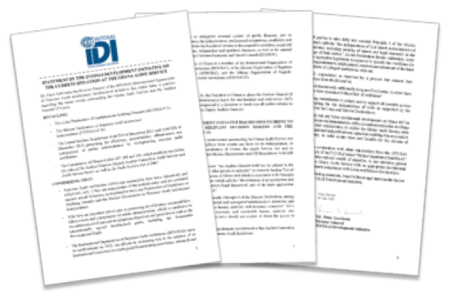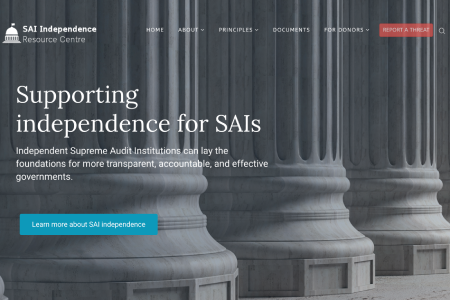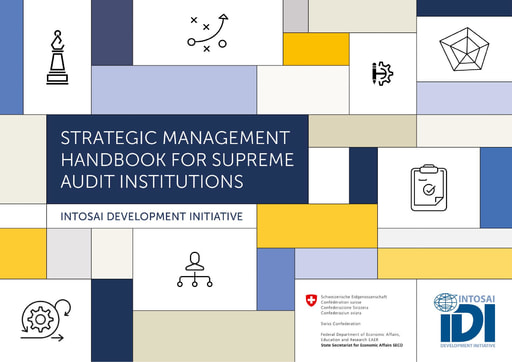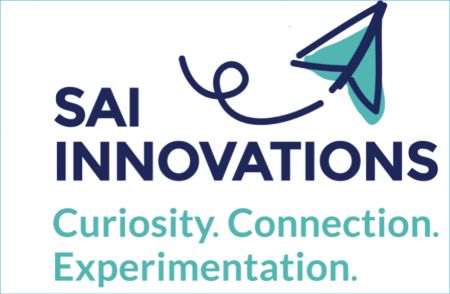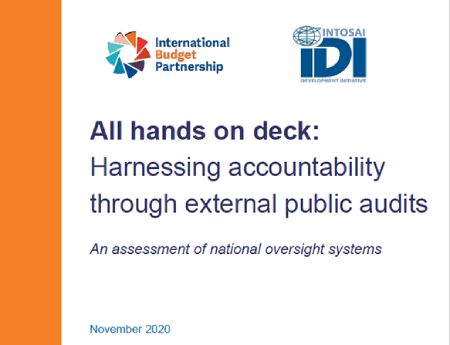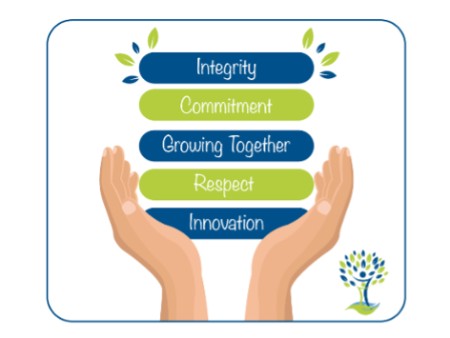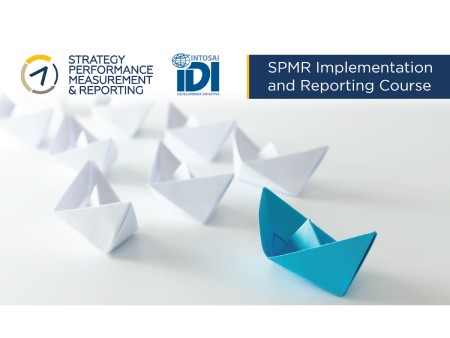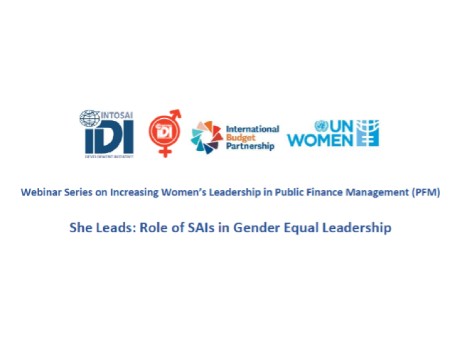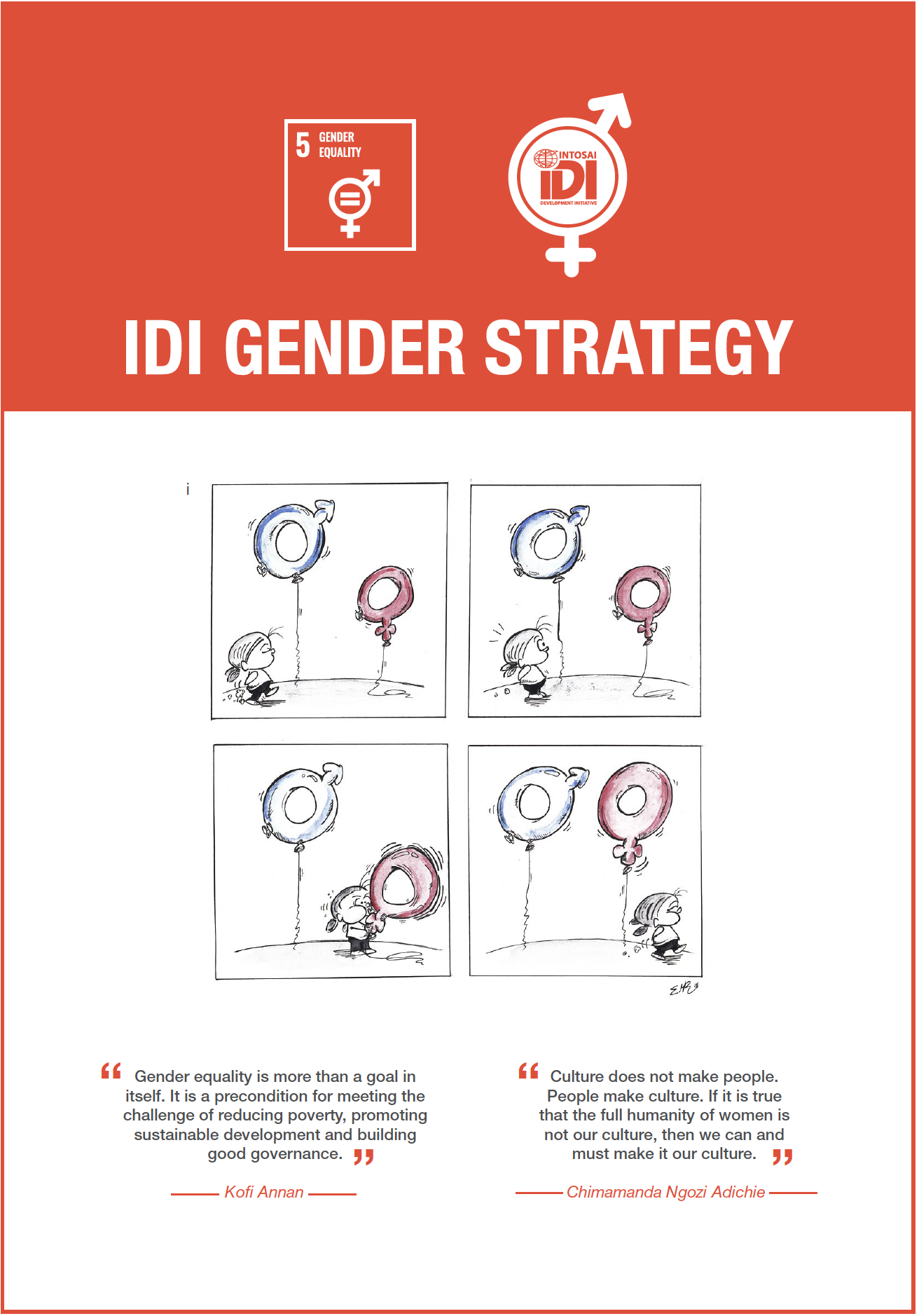Performance & Accountability
IDI REPORT 2020
HIGHLIGHTS
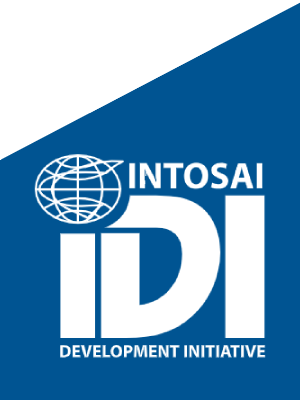
From the Director General’s Desk
2020 was an extraordinary year, a year none of us will ever forget. The outbreak and global spread of COVID-19 has disrupted the world and challenged many of the things we took for granted and cherished. The year has been no less extraordinary from an IDI perspective. We have worked from home for large parts of the year, delivered all our initiatives virtually and “resilience, agility, foresight and flexibility” have become our new buzzwords. We have used the online space both for professional work and social chats and meetings.
As governments continue to balance emergency response and economic recovery, the need for transparency, accountability and inclusiveness in public spending is paramount. The expectations towards Supreme Audit Institutions (SAIs) on effectively contributing to this is higher than ever. At the same time COVID-19 has deeply affected SAIs themselves. They are torn between heightened demand for accountability and oversight in crises, and face challenges to ensure business continuity and the physical and mental well-being of their staff.
In IDI we have been fortunate enough to maintain business continuity throughout 2020, and we have seen the demand for IDI support grow, including support in emerging areas such as ICT governance and audits responding to emerging priorities and risks arising from COVID-19.
Almost exactly a year ago, we went into our first lockdown with all staff working from home and all travel coming to a halt. I am exceptionally proud and grateful for the way IDI staff has reacted to the situation. Their response was determination and resilience. They supported each other and did their utmost to continue delivering support to help SAIs through this challenging period.
We successfully, if not without stress, enhanced and adapted our support to SAIs during the first half of 2020, rapidly adapting our service delivery model and portfolio of capacity development initiatives to the New Normal and emerging SAI needs. We adopted the F.A.R Approach (Flexible, Agile, Resilient Approach) to delivery of support, and are encouraging SAIs to use this same approach in conducting their audits. This entails moving from separate online e-courses and face to face meetings to an integrated education and audit support framework. New initiatives were quickly launched, such as supporting audits of Strong & Resilient National Public Health Systems linked to SDG indicator 3.d. We also launched our Transparency, Accountability and Inclusiveness (TAI) audits in the use of emergency funding for COVID-19 to support SAIs to undertake agile compliance audits of emergency funding. And we redesigned our Well-Governed SAIs work stream to provide support to SAIs on ICT management, risk management and crises management. Further, we published a new IDI Gender Strategy in 2020. It will guide our work on gender equality and women’s empowerment within our own organisation, with SAIs and other partners.
Through our efforts, and with the strong support of all our partners, we have been able to expand our portfolio and to meet most of the targets in our 2020 Operational Plan. In many cases, we exceeded them. The move to virtual delivery has allowed us to reach out to more SAI staff than ever before, even if we recognize that the breadth at times can come at the cost of the depth of support.
I am convinced that effective, accountable and inclusive SAIs are more important than ever in the current context, and I am very grateful for the strong support from all our key stakeholders, including the INTOSAI community and donors during a challenging 2020.


Global Support, Global Impact
126 SAIs
participated in long-term IDI capacity development initiatives; 10 in standalone training initiatives; and 131 in knowledge sharing and awareness raising events
200+ SAI teams
supported through 19 long-term SAI capacity development initiatives delivered across 6 strategic priority areas
3 SAIs
provided long-term, holistic bilateral support, and 8 more provided strategic support to secure long-term partnerships
2,573 SAI staff
participated in IDI initiatives, including: 1,103 in long-term capacity development initiatives; 17 in standalone training initiatives; and 1,453 in knowledge sharing and awareness raising events
5 Flagship initiatives
being delivered in response to the COVID-19 pandemic
61 SAIs
being supported to integrate elements of inclusion and gender into their strategic plans and/or audits
31 SAIs
in fragile and conflict affected situations participated in longterm IDI capacity development initiatives
5 Strategic Partnerships
working together to strengthen public external audit and 5 SAIs partnering with IDI to provide support to their peers
SAIs DELIVERING VALUE
Globally, threats to SAI independence remain significant.
SAIs play a fundamental role in helping countries progress towards their national Sustainable Development Goals (SDGs). This is increasingly through direct efforts to audit and improve national preparedness for and implementation of the SDGs. This complements the traditional focus of SAIs on ensuring good governance, transparency, accountability, stewardship of public funds and contributing to the fight against corruption.
In spite of, and in response to, the COVID-19 pandemic, SAIs around the world delivered significant value for all during 2020. IDI is proud of its role in supporting SAIs to make a difference.
COVID-19 has fundamentally impacted not only on the ability of SAIs to deliver on their mandates, but also altered the work SAIs need to do to maximise their value to society. As the pandemic hit, IDI was supporting SAIs in 43 countries to develop their strategic plans. This presented an opportunity to enhance their strategic relevance to emerging public sector challenges. These SAIs responded by recognising three emerging themes in their strategic plans:
- Ensuring transparency and accountability of the use of emergency funds through audits of topics such as vaccine procurement and enterprise financial support
- Prioritising performance audits of key social sectors, especially public health
- Enhancing digitisation efforts to increase government efficiency and service delivery in COVID times through IT audits
SAI Independence Rapid Advocacy Mechanism (SIRAM) in Ghana
In Ghana, since 2017 the Auditor General has been vigorously pursuing the misuse of public funds by issuing over 100 surcharges, which have returned over USD12 million back to government coffers.
When the Auditor General was sent on enforced leave from office in 2020, IDI put its SAI Independence Rapid Advocacy Mechanism (SIRAM) into action, coordinating advocacy efforts with national stakeholders and international development partners.
IDI issued a statement of concern regarding the situation, raising several issues which suggested the constitutional independence of the Auditor General may have been breached. Related cases have since been brought to the High Court in Ghana. Globally, threats to SAI independence remain significant, with increasing executive powers during the pandemic representing a risk to SAI independence globally. Preliminary data on SAI independence suggests a stalling or backsliding in average levels of SAI independence globally compared to those reported in 2017.
PERFORMANCE AGAINST KEY IDI 2020 TARGETS
| Target | Result | ||||
|---|---|---|---|---|---|
| Global Outreach |
|
Number of SAIs participating in IDI initiatives in 2020 | 90 | 168 | |
| Independent SAIs |
|
Cumulative % of cases of threats to SAI independence referred to IDI to which IDI helped develop a coordinated stakeholder response to support the SAI, issued within 30 days of referral | 75% | 100% | |
| Well-Governed SAIs |
|
Cumulative number of SAIs (all countries) with a finalised SAI performance report based on the SAI Performance Measurement Framework (SAI PMF) | 70 | 70 | |
| Professional SAIs |
|
Cumulative number of SAIs supported by IDI to submit ISSAI-based Cooperative / pilot audits to the relevant authority | 10 | 10 | |
| Relevant SAIs |
|
Cumulative number of SAI staff trained through cooperative audits for SDGs, leveraging on technological advancement, eLearning specialists, blended learning specialist, LMS administrators, facilitating audit impact | 613 | 758 | |
| Bilateral Support |
|
Cumulative number of SAIs that use operational plans, internal reporting and issue a SAI Performance report annually | 4 | 4 | |
| Global Foundations |
|
Cumulative number of SAIs supported by IDI to submit capacity development proposals to potential funders | 20 | 47 | |
| Inclusiveness & Gender |
|
Cumulative number of SAIs (supported by IDI) that have a target relating to gender in their strategic plans | 5 | 8 |
Globally, over USD 100 billion has been mobilised for COVID-19 emergency response in developing countries, much of this through the International Monetary Fund (IMF). These funds are being spent rapidly, in a high-risk environment, often with normal expenditure controls – such as competitive public procurements – weakened or removed. Very early in the crisis, SAIs such as New Zealand and Sierra Leone recognised the need to act quickly to ensure emergency spending rules were clearly communicated, that public officials were reminded to ‘keep the receipts’, and that an expectation of accountability for the use of public money (through subsequent audit) was maintained. Further, to ensure maximum impact on the use of emergency funding, they acted with agility to audit and report quickly and repeatedly on the use of public funds. In 2020 several SAIs completed and issued hard hitting public reports on the use of COVID-19 emergency funds, including South Africa and Sierra Leone. In this spirit, IDI issued guidance on Accountability in a Time of Crisis, and began developing its COVID-19 flagship initiatives.
Sustained efforts to strengthen SAI audit practices appear to be reaping rewards. Compared to 2017 levels, preliminary 2020 data suggest significant increases in the number of SAIs with ISSAI (International Standards of Supreme Audit Institutions) compliant audit standards, as well as use of these standards in practice. Improvements are particularly notable in financial and performance audit, while initiatives such as TAI will enable IDI to support SAIs to strengthen their compliance audit approaches.
Even in the most challenging environments, SAIs continue to make a difference. In 2020, SAI Somalia’s published annual audit report attracted widespread media attention, and a new audit bill passed through the Lower House of Parliament and was submitted to the President for signing. In South Sudan, audit reports covering the IFMIS system, petroleum sector, Development Funds, and waste management were completed and printed. Unfortunately, stalled progress in reconstituting the National Assembly (the legislature) means a continuing accountability gap. IDI, in coordination with several other partners, will continue to play a key role in supporting SAIs in both countries.
SAIs are also leading by example in transparency, accountability and promoting gender equality. In 2020, SAIs in Eritrea, The Gambia, Sierra Leone and Zimbabwe prepared annual SAI performance reports for publication, holding themselves accountable for their use of public funds. Further, the SAIs of Niger, Togo, Guinea, Madagascar, DRC and The Gambia set gender targets in their strategic plans, related to their organisation, their audit work or both. These SAIs were all supported through IDI’s Accelerated Peer-Support Partnership Programme.
COVID-19 Flagship initiatives
TAI: audit of transparency, accountability and inclusiveness in the use of emergency funding. In 2020, regional SAI leadership conversations brought together SAIs to share their challenges and solutions to continuing operations during COVID. 57 SAIs have committed to embarking on such audits, to be supported by IDI through an integrated education and audit support framework.
Audit of Strong & Resilient National Public Health Systems (3.d Audit): supporting SAIs in 40 countries to examine government efforts to strengthen capacities for early warning, risk reduction and management of national and global health risks.
Audit of the shadow pandemic: pilot audit of national targets related to SDG5.2: elimination of violence against women (with SAI Uganda)
IMF: exploring with the IMF how audit related commitments in emergency funding Letters of Intent (LOIs) can be a driver for better audit of the use of emergency funds, as well as strengthening the legal and institutional framework for these audits. Further, starting a broader collaboration involving joint initiatives, as well as mutual support for each other’s SAI capacity development work.
Bilateral Support: facilitating SAI audits of the use of emergency funding in The Gambia, Madagascar and South Sudan, and following-up implementation of audit recommendations.

INDEPENDENT SAIs WORK STREAM
Agile advocacy to maintain SAI independence
Independence is crucial for effective and credible SAIs. Yet the more effective SAIs become, the more vested interests have to gain from undermining their independence. IDI established the SAI Independence Rapid Advocacy Mechanism (SIRAM) to react when SAI independence is threatened.
In 2020, we were able to assess and respond to threats received, for example in Ghana, which led to the issuance of official statements on independence concerns and wider stakeholder consultation. We were also able to refine the mechanism based on user feedback which led to a reduction of processing timelines, the expansion of the groups of stakeholders to consult and engage when processing a case, the inclusion of a feedback loop and the development of a monitoring function to identify trigger events and windows of opportunity. This has enabled us to provide more effective advocacy support on SAI Independence in more agile and timely manner.
Create and disseminate knowledge on SAI independence to stakeholders
Diverse stakeholder groups at the country, regional and global levels all recognise and support the fundamental importance of SAI independence and the contribution it can make to better public services and people’s lives. These stakeholders share IDI’s goals. Yet they often lack easy access to targeted advocacy materials on SAI independence which could make their work more effective.
In 2020, we strengthened our capacity to advocate in a digitised environment through the development of the SAI Independence Resource Centre (SIRC) which is one stop shop providing access to a wealth of resources on SAI Independence. This was supplemented by the development of other advocacy tools such as the SAI Independence Resource Kit for In-Country Donor Staff which is also available in all IDI working languages. This has ultimately strengthened stakeholders’ capacity to understand, assess and support SAI Independence and will support the establishment of more powerful and nimble coalitions for SAI Independence.

WELL-GOVERNED SAIs WORK STREAM
Embracing COVID-19 as an opportunity for creating stronger SAIs

Enhancing SAI strategic management and relevance during a pandemic
Planning for and managing SAI performance are fundamental focus areas under the Well- Governed SAIs work stream. Under the Strategy, Performance Measurement and Reporting (SPMR) initiative, over half of the 43 participating SAIs found themselves working on their new strategic plans as the pandemic hit.
Despite the practical challenges, the SAI teams recognised early on that COVID-19 could provide an unparalleled opportunity to enhance their strategic relevance. For that, strategic plans needed to prioritise key SAI products and work that contribute to resolving critical public sector challenges brought forward by the pandemic.
With IDI’s support, which included a dedicated webinar series, two guidance documents, and continuous remote support for each team, SAIs embarked on the quest to develop not only highly relevant, but also realistic strategic plans, which reflect the SAI’s mandate and resources.
At the heart of many of the new strategic plans under development lie a myriad of specific priorities brought forward by COVID-19. Some SAIs chose to focus on supporting digitalisation efforts in their countries, for example through IT audits. Others will prioritise performance audits in the social sector, in order to support the effectiveness of public spending in those essential areas.
Finally, for many SAIs, the focus will be on facilitating accountability and transparency of emergency funds, for example through audits of vaccine procurement or of emergency financial support to enterprises.
Stage 1

Emergency response
Stage 2

Preparation for new tasks and challenges
Stage 3

Finalisation of revised organisational plans
Stage 4

Implementation and planning ahead
The new SAI Strategic Management Handbook is a Global Public Good available to all SAIs that aim to sustainably improve their performance through better and more inclusive governance
At the end of 2020, we published the new SAI Strategic Management handbook. It provides comprehensive, step-by-step guidance on all stages of the SAI strategic management process, from assessing the current performance, through strategic and operational planning, to implementation, decision-making and evaluation. The handbook also reflects on major crosscutting issues and developments such as gender, COVID-19, risk management and leadership.
The handbook is suitable for SAIs from both developing and developed country contexts and includes suggestions on both minimum-level requirements and more advanced features. It can be applied by SAIs irrespective of their institutional set-up.
The handbook captures the experiences of more than two years of piloting and implementation of the SPMR initiative across all INTOSAI regions. More than 20 SAIs from various parts of the world and different set-ups provided specific comments that fed into the final version, making the creation of the handbook a genuine global effort, leading to a final product that is relevant and useful to all SAIs.
Plan A
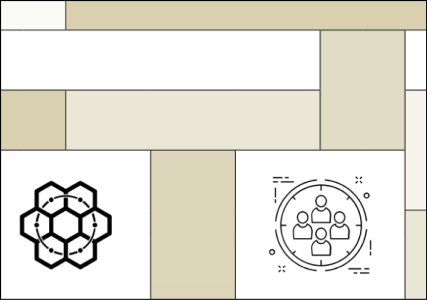
Principles of Strategic Management of SAI
Plan B
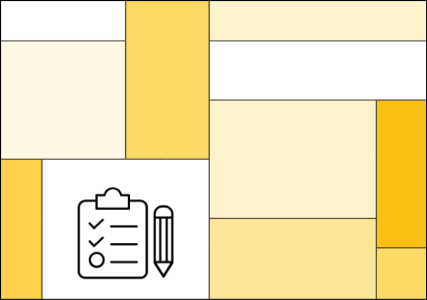
Strategic Planning
Plan C
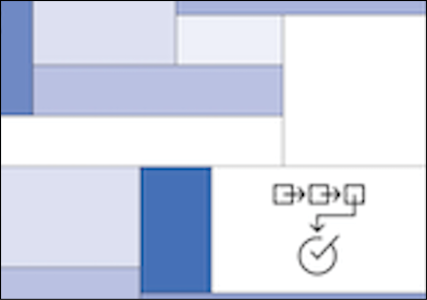
Finalisation of revised organisational plans
Plan D
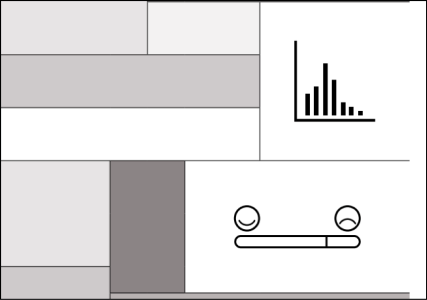
Implementation and planning ahead
A truly global tool for measuring SAI performance
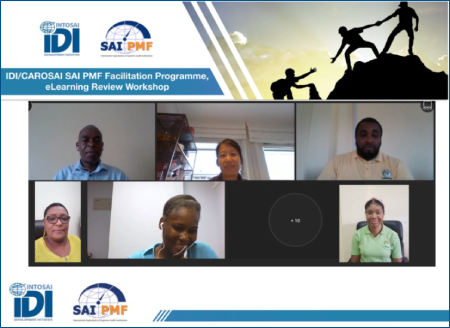
SAI PMF withstands the test of application in times of COVID-19
Less than five years after its official endorsement at the XXII INTOSAI Congress (INCOSAI) in Abu Dhabi, the reach of the SAI Performance Measurement Framework (SAI PMF) across the SAI community is stronger than ever. At the end of 2020, the cumulative number of all finalised SAI PMF assessments reached 77. SAIs and providers of capacity development support can now firmly count on SAI PMF as the preferred tool for establishing a baseline on performance and alignment to the INTOSAI principles and standards.
Not even the COVID-19 pandemic could put a halt to the over 30 ongoing assessments, despite the practical challenges of accessing files and ensuring coordination. The demand for training on SAI PMF, including for enhanced IDI support for facilitated SAI PMF assessments, continued being high. IDI’s SAI PMF team has been working relentlessly to provide support to SAIs applying or considering the methodology. The SAI PMF basic training course was turned into a fully-fledged e-Learning course and delivered twice over the year. The first such delivery was in the framework of a facilitated SAI PMF programme for the CAROSAI region, taking place fully digitally. For those SAIs working on their SAI PMF reports as part of the SPMR initiative, the emphasis of IDI support was on finalisation and independent review. In addition, the team managed to release a series of highly relevant guidance documents, such as an update of the SAI PMF Frequently Asked Questions. The entire SAI PMF document is undergoing a light-touch revision to ensure alignment to the changes in INTOSAI’s framework of principles and standards.

PROFESSIONAL SAIs WORK STREAM
Balancing agility and compliance in COVID-19 Audits
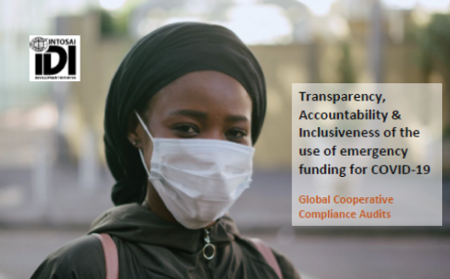
Over 50 SAIs to audit transparency, accountability & inclusiveness of emergency spending
Does agility require SAIs to give up on quality? Can SAIs stay true to quality during COVID times?
IDI’s global initiative of compliance audits on transparency, accountability and inclusiveness in the use of COVID-19 funding (TAI Audits) helps SAIs across the world to answer these questions. Following SAI leadership and stakeholder conversations, 57 SAIs across INTOSAI regions have committed to taking up TAI audits. In conducting TAI audits, these SAIs will follow compliance audit ISSAIs and use an agile approach in examining transparency, accountability and inclusiveness in the use of emergency funding for COVID-19. Manageable in scope, the TAI Audits will examine compliance frameworks and/or individual transactions related to emergency procurement or socio- economic packages. Recommendations from TAI audits are expected to contribute to improved transparency, accountability and inclusiveness of COVID-19 spending. In the longer term we expect to see nations put in place robust compliance frameworks for future emergencies.
IDI support to the SAIs include a practical guidance on TAI audit, an online integrated education and audit support platform, audit support throughout the audit, support with stakeholder engagement and facilitation of audit impact of TAI.
Growing SAI Young Leaders
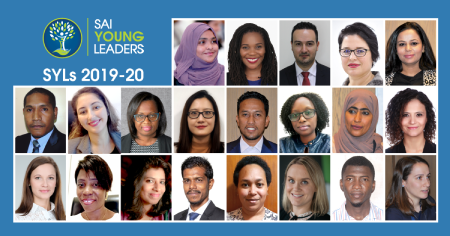
Changed SAI young leaders bring positive change in SAIs
21 SYLs from 17 countries successfully graduated in 2020. SYLs implemented change strategies in the following areas: Effective communication and stakeholder engagement; High Impact SAI Audits; Enhanced SAI Performance and Capacity; Leverage on Technological Advancement and Strategy for Reporting on the Implementation Status of Audit Recommendations.
In response to COVID travel restrictions, IDI took the SYL initiative entirely online in the second half of 2020. We experimented with a range of synchronous and asynchronous learning and collaboration methods to keep together the SYL community and facilitate peer-to-peer learning. SYLs reflected on leadership in COVID times, shared experiences and checked on each other. They also worked together to write an article on leadership in COVID times for the INTOSAI journal.
We were proud to see SYLs demonstrate resilience and flexibility in responding to the changes in their environments. Their reflections during the final presentations showed that the SYLs had been supporting each other as a community despite interacting only virtually during 2020.
Closing the Quality Loop
Continual improvement in quality of financial auditing in South East Asia
Eight SAIs of Cambodia, Indonesia, Lao PDR, Malaysia, Myanmar, Philippines, Thailand, and Vietnam demonstrated their commitment to quality and continuous improvement by undergoing quality assurance reviews for their financial audits.
They had conducted these ISSAI based financial audits as a part of IDI ASEANSAI cooperative financial audit initiative in 2019. While we supported SAI teams in managing audit quality throughout the audit process, these independent quality assurance reviews close the quality loop by as certaining compliance to quality control procedures and providing recommendations for continuous improvement.
Some of the high points of this exercise were:
- independent and competent QA reviewers from across the INTOSAI regions conducted these reviews
- the reviews used a blend of online and onsite work
- an independent reviewer assured the quality of the QA reviews
- the report not only as certained compliance but also provided recommendations for improving quality
- The Heads of SAIs show committed to implement QA recommendations.
Ensuring audit quality is a continuous process and we are delighted to seesuch a strong beginning to this journey.
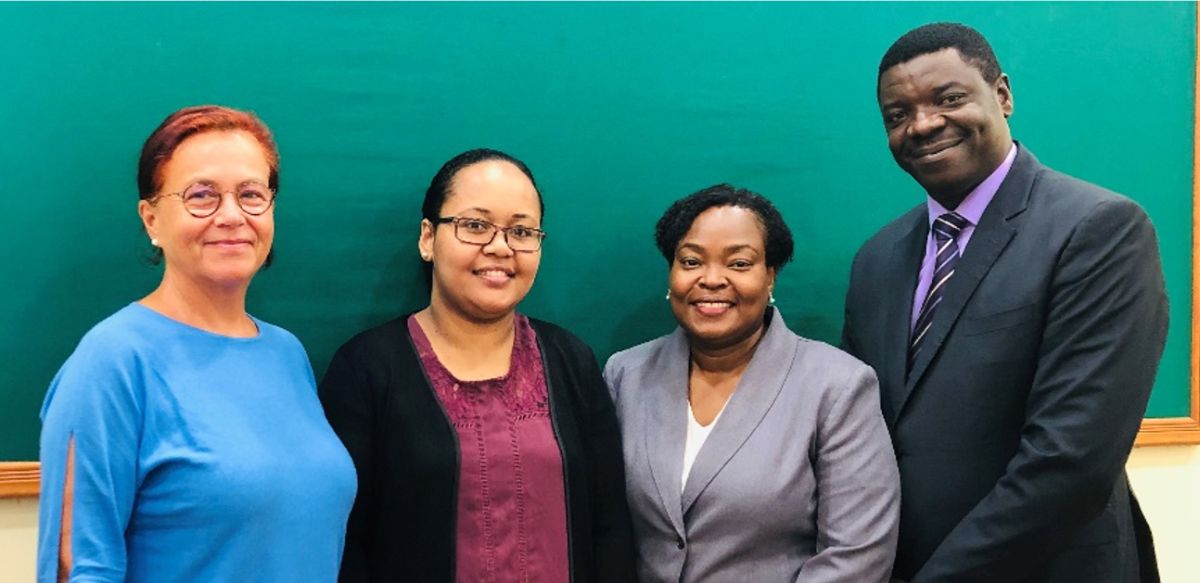

RELEVANT SAIs WORK STREAM
Bringing together SAIs and stakeholders to explore ‘fit for purpose’ innovative solutions
In SAI Innovations’ theme 2020 Innovative SAIs going F.A.R. (Flexible, Agile and Resilient) we explored why innovations matter for all of us in the SAI community, how SAIs can adopt innovative audit practices to stay relevant, embrace the principle of “leave no one behind” and deliver value and benefits to all. Our Innovative ‘SAIs going F.A.R.’ discussions looked at SAI innovations from an institutional and a people perspective, from a technological and social perspective; and from the perspective of what is fit for purpose for SAIs with diverse capacities and local contexts.
549 SAI staff, stakeholders and SAI leaders participated in two framing webinars and two SAI innovations marketplace events. Responding to language needs and time zones difference, the framing webinars provided for interpretation and were held in two rounds. Introduced in 2020, the SAI marketplace provides SAIs and stakeholders a platform to share innovations in their work. SAI of Costa Rica and IBP used this platform to share their work on agile audits and innovations in SAICSO engagement.
Building back better
SAI contribution through audits of SDGs implementation
The COVID-19 pandemic led to a backslide on the achievements under most of the SDGs. However, the pandemic also provides nations with an opportunity to reflect on lessons learned and build back more inclusive, equal, resilient and sustainable societies.
55 SAIs in six INTOSAI regions are contributing to building back better by embarking on audits of SDGs implementation related to strong and resilient national public health systems (SDG 3.d), sustainable public procurement (SDG 12.7) and elimination of intimate partner violence against women (SDG 5.2).
As pilots of IDI’s SDGs audit model (ISAM), published in 2020, these audits employ a whole of government approach and examine coherence, coordination, participation and inclusiveness of government efforts in implementing nationally agreed targets. They also mainstream audit impact and audit quality considerations throughout the audit process. We have created an online integrated education and audit support platform to support SAI teams. They have also been trained in innovative tools like SDG ecosystems map, use of data analytics, and use of stakeholder engagement tools for conducting these audits.

Bilateral support
Delivering value in the most difficult contexts
Auditor General of Somalia presents audit reports to the press in November 2020
The SAIs of South Sudan and Somalia delivered reports despite immense challenges
South Sudan and Somalia were facing some of the world’s worst economic, political, and humanitarian crises even before COVID-19 hit. Yet, despite everything, the SAIs of both countries managed to deliver critical audits in 2020.
SAI South Sudan finalised and printed four performance audits and one special audit report. These audits covered a wide range of important topics including: the government’s integrated financial management information system; local content in the petroleum sector; constituency development funding; efficiency in the Juba teaching hospital, and Juba city council waste management. The reports are now awaiting submission subject to the forming of Parliament as required by the peace agreement.
For the second subsequent year in its history, SAI Somalia published the results of both compliance and financial audits, demonstrating its ability to deliver on its main mandate while also increasing audit coverage. The release of the reports was well covered by media, enabling the wider public to engage in the critical issues raised, including missing documentation and due processes for a large number of government payments and contracts.
Leaving no SAI behind
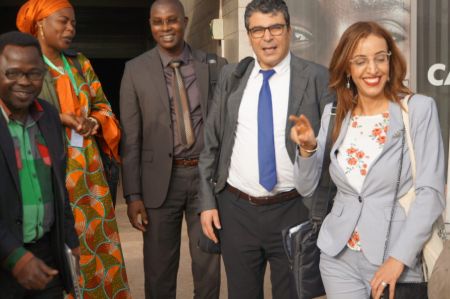
Peers from Morocco, Senegal and Tunisia contribute to project planning in Niger
Three SAIs in challenging contexts have established new long-term support projects
Unfortunately many of the most challenged SAIs in the world lack the reliable, long-term support they need to improve their performance and deliver value for citizens. Recognising this problem–and building on a call by the INTOSAI Donor Cooperation—IDI, AFROSAI-E and CREFIAF established the Accelerated Peer-Support Partnership (PAP-APP) in 2018.
The objective of the programme has been to support nine SAIs operating in some of the most difficult contexts to map out their needs and strategic priorities, and seek any required capacity development support.
A major programme milestone was reached in 2020 when the SAIs of Madagascar, Niger and The Gambia secured significant donor funding for new long-term support projects. These projects are remarkable not only for their grounding in the SAIs’ own strategies and systems, but because they will benefit by the contributions of peers from a wide range of SAIs including France, Kenya, Latvia, Morocco, Norway, Sierra Leone and the UK, as well as experts from international NGOs.
A remaining challenge is to mobilize scaled-up support for SAIs who have not yet secured this, in particular those of Democratic Republic of Congo, Eritrea, Togo and Guinea.
Leading by example
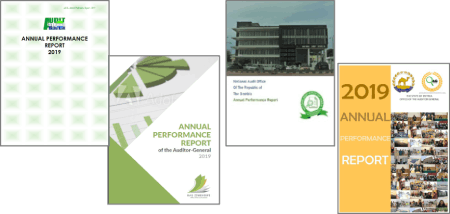
Four SAIs developed detailed annual performance reports, one for the first time
In countries where transparency and accountability are otherwise limited, SAIs can make a difference through leading by example. This is especially true when it comes to publishing information on their own progress and results.
In 2020—with peer support and funding from the PAP-APP programme—the SAIs of Eritrea, The Gambia, Sierra Leone and Zimbabwe prepared detailed annual performance reports. Though all have been finalised, two are awaiting publication in early 2021. In The Gambia, this is the SAI’s first for public consumption.

GLOBAL FOUNDATIONS
New global report urges stakeholders to strengthen oversight during the pandemic
Under the IDI-IBP Strategic Partnership, one key delivery of 2020 is the report "All Hands on Deck: Harnessing accountability through external public audits".
The report
- gives a comprehensive look at the strength of audit and oversight systems globally and regionally based on Open Budget Survey data
- uncovers that while institutional frameworks are seemingly a strength in the accountability ecosystem, there are extensive issues related to implementation of audit recommendations and scrutiny, as well as public participation in the process.
- provides recommendations for a wide range of stakeholders, including SAIs, donors, CSOs and governments
- includes considerations on the COVID-19 situation, and the need to provide assurance on emergency spending
- provides relevant input on how to include civil society in the budgetary and oversight process
- is available in English, French, Spanish and Arabic
The report was followed by a joint launch which brought together representatives from SAIs, donors and CSOs. The event was delivered in English, French, Spanish and Arabic and was attended by more than 350 participants.

GLOBAL FOUNDATIONS
Supporting SAI Resilience
ICT support to SAIs through the INTOSAI Continuity of Operations During COVID-19 grant
Supporting SAI Resilience and the need to provide agile support became even more important during the COVID-19 pandemic as SAIs adjusted to a way of working outside their norm. The challenges to continue carrying out their mandate were flagged by many SAIs as related to the lack of or limited ICT capabilities and resources, according to a survey on the impact of the pandemic on SAIs conducted by IDI. IDI’s Global Foundations Unit supported INTOSAI to react quickly in offering funding for ICT support to all INTOSAI Member SAIs through the INTOSAI Continuity of Operations During COVID-19 grant. Euro 700,000 was made available for this support and 34 SAIs were approved for this grant and awarded EURO 10,000 each.
Cross-Cutting Priorities

SAI Culture and Leadership
All SAI development is a change process. This requires committed and effective leadership, and a recognition that change cannot happen without understanding and working within the culture of an organisation. IDI initiatives across all work streams, bilateral support and Global Foundations engage with and support SAI leadership in change processes.

SAI Communications and Stakeholder Management
To deliver value and benefits for all citizens, and to embark on successful change processes, SAIs need to be outwardfacing organisations, with a good understanding of their stakeholders.

Inclusiveness and Gender
IDI’s vision is a world where are genderresponsive, leave no one behind and benefit everyone. Thus, IDI’s ambition is to step up IDI engagement on gender and on supporting gender responsive SAIs across the IDI portfolio. Active collaboration with INTOSAI bodies, women’s organisations, such as UN Women, and other stakeholders, and piloting gender focused engagement in IDI will support the successful integration of a gender perspective in the SAI world.
CROSS-CUTTING PRIORITIES
During 2020, these crosscutting priorities could be seen for example in IDI’s initiatives which reflected the importance of leadership, stakeholder engagement and gender. These examples also show how the different cross-cutting priorities can interlink with each other
GREAT LEADERSHIP CAN MAKE A DIFFERENCE
Involving SAI leaders across IDI initiatives as key to success
In 2020, 21 SAI young leaders graduated from our 2019-2020 cohort. Building on IDI’s support, they successfully developed integrated change strategies for their SAIs and presented them to their leadership. Supporting, enhancing and shaping leadership that includes a gender and inclusiveness lens cuts across IDI initiatives. The SAI Young Leaders initiative is one example where IDI zooms in on leadership. The Strategy, Performance Measurement and Reporting (SPMR) initiative also entails a major focus on leadership and engages SAI leaders from over 40 SAIs on topics such as strategic planning and prioritisation, decision-making and change management towards stronger SAI performance.
IDI’s bilateral support involves and regularly interacts with SAI leaders in the design and implementation of projects. Success stories such as the submission of a new audit bill in Somalia or a better gender integration in the strategic plans of six SAIs participating in our Accelerated Peersupport Partnership (PAP-APP) is only possible with the support of SAI leadership.
IDI’s engagement in a webinar series on “Increasing Women’s Leadership in Public Finance Management” is another example of how we support leadership. This was jointly organised by IDI, UN Women and the International Budget Partnership. In December 2020, IDI facilitated a webinar that brought together female and male leaders to discuss and recommend ways to enhance women’s leadership in SAIs and SAIs’ role in this. It was a success in itself to have put women’s leadership on the SAI Community’s agenda and to involve SAIs across INTOSAI regions. This strongly connects with IDI’s gender and inclusiveness focus and will be followed-up in 2021.

Engaging stakeholderswill create an impact
Building on the SAIs Engaging with Stakeholders initiative in multiple areas of IDI’s work
Engaging with stakeholders is a prerequisite for SAIs that strive to be relevant and contribute to making an impact for their society. Understanding the needs and expectations of parliaments, auditees, human rights institutions, CSOs, academia, and the private sector, enables SAIs to select important audit topics, propose better solutions, recommendations, and follow up. It also allows SAIs to identify realistic and meaningful strategic priorities, engage confidently on issues of mutual interest, and obtain valuable feedback on their work. All of this helps to create more impact for everyone.
Much of the groundwork for IDI’s cross-cutting priority on stakeholder engagement was laid in the SAIs Engaging with Stakeholders (SES) initiative, which came to an end in 2020. Almost 70 SAIs prepared strategies for stakeholder engagement under SES. They have been used as key input for strategic planning under the Strategy, Performance measurement and reporting (SPMR) initiative, or as a tool to advocate for SAI independence. SES has also supported our stakeholder approach under the IDI SDG Audit Model (ISAM), where we recommend mainstreaming multi-stakeholder engagement throughout the audit process of SDGs implementation. SAIs can also audit multi-stakeholder engagement within SDG by examining government efforts to reach out to and involve multiple stakeholders in the setting and implementation of nationally agreed targets linked to SDGs.
In 2020, we mainstreamed stakeholder engagement into audits of SDG implementation related to strong and resilient national public health systems (SDG 3.d), sustainable public procurement (SDG 12.7) and into the pilot audit on eliminating intimate partner violence against women (linked to SDG 5.2).

LET’S PUT ON OUR GENDER GLASSES
Continuous efforts for better results
COVID-19 shows that gender and inclusiveness are at stake. Mainstreaming them is a continuous and long journey but more necessary than ever. If SAIs want to improve people’s lives and leave no one behind, they must address gender and inclusiveness. With a new IDI Gender Strategy in place, we have created a sound basis for our gender work.
Our Accelerated Peer-support Partnership (PAP-APP) with nine African SAIs is a perfect example of how we successfully nudged and helped interested SAIs to integrate gender into their Strategic Plans. The SAIs of Niger, Togo, Guinea, Madagascar, DRC and the Gambia have defined gender targets in their plans. The targets are related to their organisation or their audit work or even both.
The pilot audit on eliminating the shadow pandemic of intimate partner violence against women (linked to SDG 5.2) is another example of how IDI supports gender audits. We know about the importance of involving SAI leadership in these issues. IDI’s involvement in the IDI, UN Women and IBP organised webinar series on “Increasing Women’s Leadership in Public Finance Management” is a clear recognition of it.
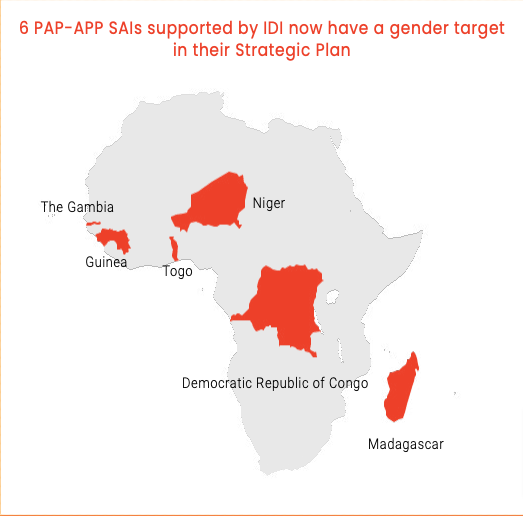
Working in Partnership
IDI aims to enhance the value and benefits of all support provided to SAIs, whether this is led by IDI, INTOSAI organisations, development partners or civil society organisations. Partnering with organisations that share IDI’s vision is fundamental to maximising IDI’s value for SAIs. During 2020, IDI engaged in strategic partnerships with the following organisations:
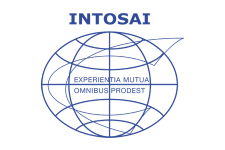
The International SAI Community has agreed on a shared vision and set of strategic priorities as set down in the INTOSAI Strategic Plan 2017-22. IDI partners with many INTOSAI bodies to support delivery of the INTOSAI plan, as well as the IDI Strategic Plan.
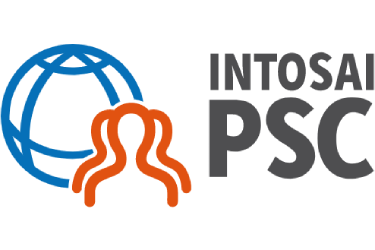
The INTOSAI Professional Standards Committee leads efforts to provide relevant and clear professional standards and guidance to Supreme Audit Institutions (SAIs). Under a signed terms of reference, the IDI cooperates with the PSC and its sub-committees on Financial Audit and Accounting (FAAS), Compliance Audit and Performance Audit in supporting SAIs in ISSAI implementation. Such cooperation includes working together on global public goods, professional education for SAI auditors, quality management and helping SAIs in conducting high quality audits.
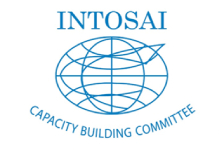
As the INTOSAI advocate and custodian for SAI capacity development, the Capacity Building Committee (CBC) is a key partner for several IDI initiatives. To maintain, promote and utilise SAI PMF for the advancement of SAIs, the CBC acts as custodian of SAI PMF and provides strategic guidance, whilst IDI takes the operational lead on SAI PMF support, coordination, and facilitation. The CBC and IDI also cooperate on auditor professional development initiatives, including IDI’s PESA-P Pilot.
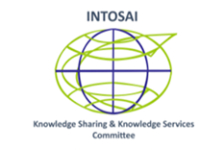
The Knowledge Sharing Committee (KSC) encourages SAI cooperation, collaboration, and continuous improvement. The KSC, and its sub-committees, have been a key partner for several IDI initiatives, including Auditing Preparedness for Implementation of the SDGs, as well as initiatives on specific subjects such as the Audit of Public Debt.
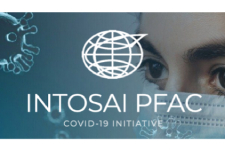
The INTOSAI Policy, Finance and Administration Committee (PFAC) ensures INTOSAI is an effective, accountable, and inclusive international organization. It coordinates preparation and monitors deliver of the INTOSAI Strategic Plan and oversees INTOSAI’s resources. PFAC and IDI collaboration includes on the INTOSAI Donor Cooperation and the ‘SAI Continuity During COVID-19’ grant.

The INTOSAI General Secretariat is INTOSAI’s permanent body, supporting all INTOSAI committees and activities. It acts as INTOSAI’s leading liaison with the United Nations. This makes it a key partner for IDI’s work with UN agencies on supporting SAIs to audit national efforts to implement the UN Sustainable Development Goals (SDGs). IDI and the General Secretariat also partner in efforts to advocate for greater SAI independence.
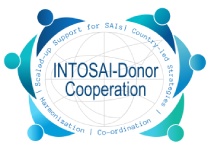
Comprising INTOSAI and 23 development partners, the INTOSAI-Donor Cooperation promotes SAI-led strategies, coordination and harmonisation of support to SAIs, and scaled-up support for SAIs. IDI plays a key role in both implementation and coordination.
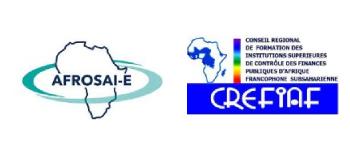
IDI, AFROSAI-E and CREFIAF have a long-term partnership to support the SAIs of DRC, Eritrea, Guinea, Madagascar, Niger, The Gambia, Togo, Sierra Leone and Zimbabwe. The programme empowers SAIs in urgent need of support and development to enhance their capacity and to improve their performance, to be able to make a difference to the lives of the citizens.
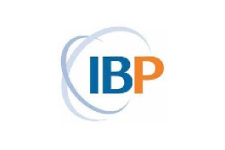
IDI partners with the International Budget Partnership (IBP) to advocate for independent and effective SAIs as essential to good public budgeting, effective governance and reducing poverty; and to support effective engagement between SAIs, legislatives and civil society in order to enhance accountability, audit impact and make a difference to the lives of citizens.
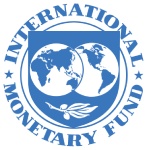
The IMF and IDI share a vision of enhanced transparency and accountability in the use of emergency funds through relevant, timely, published audit reports; and independent, credible and effective SAIs contributing to good financial governance, addressing governance vulnerabilities including corruption.
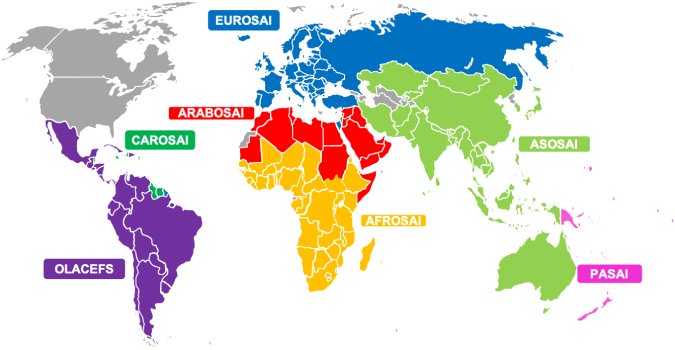
INTOSAI Regional Organisations
IDI works in close cooperation with AFROSAI, ARABOSAI, ASOSAI, CAROSAI, EUROSAI, OLACEFS and PASAI, as well as sub-regional bodies AFROSAI-E, CREFIAF and ASEANSAI. The regions provide a crucial link between IDI’s global perspective, and the specific strengths, challenges and needs of their member SAIs. These bodies are key partners for the delivery of many IDI initiatives.
IDI is also increasingly engaging with UN Women to support SAIs to include a stronger gender equality focus in their audit activities.

Delivery in times of crisis
Digital technologies have become essential in the response to COVID-19. During 2020, IDI scaled-up its digital education support both within IDI, and as a service for others within INTOSAI. We invested in solutions for online work and developed staff competencies to facilitate effective online processes. IDI mobilised platforms and formats for conducting interactive, meaningful and effective digital education and online work. These digital solutions were selected and adapted to ensure inclusive online events – leaving no SAI behind.
MOVING TOWARDS ONLINE WORK
Scaling-up digital education and infrastructure
Digital Education technologies have been essential in the response to COVID-19. IDI’s relevant SAIs work stream has scaled-up its digital education support both within IDI, and as a service for others within INTOSAI. Our long-term investment in digital education has paid off. IDI has been able to use its Digital Education infrastructure to conduct interactive, meaningful, and effective digital education and online work initiatives. These digital solutions have been selected and adapted to ensure inclusive online events.
IDI moved a large amount of work online to facilitate continued service delivery in 2020. The Digital Education Initiative made this possible by upgrading systems to host a larger number of users and courses, investing in collaboration and video conferencing tools, providing training and advice in-house and to the INTOSAI community (ARABOSAI, ASOSAI, EUROSAI, PASAI, INTOSAI Committees, and SAI Russia). Several of the most challenged SAIs were supported with funding for internet and basic IT-tools such as teleconference speakers, which enabled continued communication during COVID-19.
Throughout our delivery we reflected on our experiences and gathered best practices and tips. We used these to create the "Healthy Interactions – Recipes for Online Facilitation" flipbook, meeting a need in the community for guidance on operating effectively online. A Massive Open Online Course (MOOC) about the use of the most common resources and activities is also available on the IDI LMS to support IDI staff and resource persons.
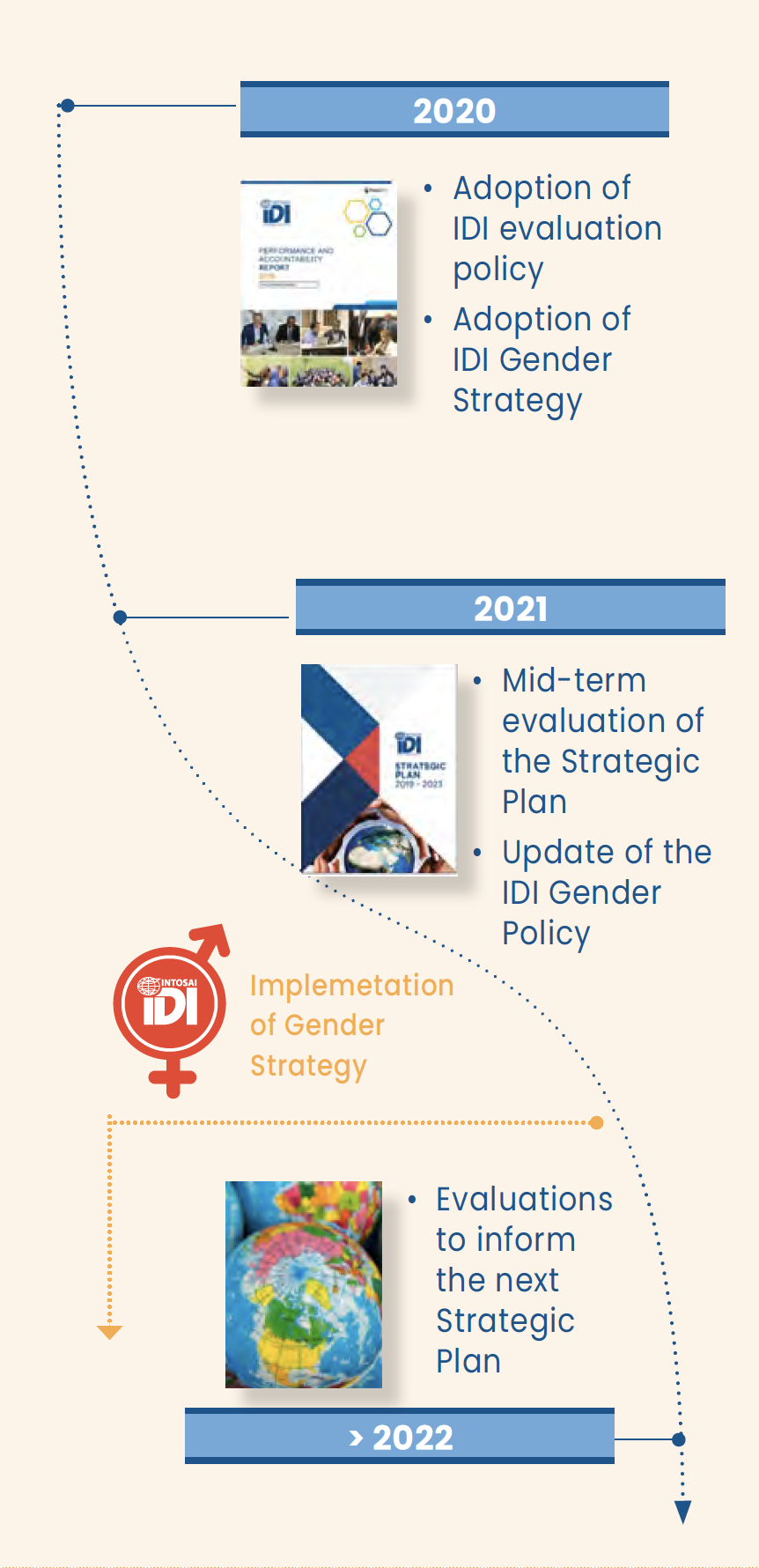
Continually Improving IDI
Accountability and Learning
During 2020, a multi-component evaluation of the Global Call for Proposals (Tier 2) and IDI’s bilateral support was concluded, covering the PAP-APP programme and South Sudan, as well as lessons for refinement and implementation of IDI’s bilateral policy. A second evaluation of IDI’s support to Somalia reached draft report stage. A selection of key findings includes:
- The GCP Tier 2 process was highly relevant and should be replicated with the aim of selecting 1-2 SAIs in each region for better regional balance
- Challenges faced by SAIs in potential Tier 2 countries regarding communication infrastructure and using ICT tools should be addressed early in future selection processes
- Project Support Groups (PSGs) were effective in enhancing coordination of support to SAIs in some countries, but other models and ad hoc arrangements should be explored where PSGs were ineffective
- For PAP-APP countries, sustainability of their new planning capacity needs to be ensured through follow-up support and at least one further round of medium-term planning
- In bilateral support, overall indicators of goal achievement should be carefully selected to reflect the success of each project; targets should be at a realistic level considering risks, and adjusted if programme assumptions do not hold
- Further support to SAI South Sudan should enhance the quality control function by advocating for adequate staffing and provide further coaching
- IDI’s bilateral support programme should include thematic or cross-cutting components such as identification of projects, securing funding, building up IDI capacity to deliver support, and monitoring, evaluation and learning
- An assessment of the absorption capacity of recipient SAIs should be added to the factors underpinning a decision on provision of bilateral support
- In future support to SAI Somalia, IDI should consider ways to be more visible in Mogadishu to the extent that security considerations and COVID travel restrictions allow
- As the consistent application of the new audit manuals cannot yet be assumed in SAI Somalia, IDI’s future efforts should be on deepening the results achieved in the 2018-20 support
Gender Strategy
IDI’s gender work moving full steam ahead
At the end of 2020, IDI published a new IDI Gender Strategy in four languages. The Strategy gives shape to our gender commitments in the IDI Strategic Plan 2019-2023. It is accompanied by a multi-annual Gender Action Plan. For the next couple of years, the Strategy is our roadmap to support SAIs in becoming gender responsive organisations and in conducting audits that contribute to gender equality. It also puts our own organisation on the spot. IDI wants to lead by example on gender equality to be a credible partner.
IDI is deeply convinced that SAIs who want to make a difference to the lives of everyone must address gender and inclusiveness in their organisations and audit work. Hence, in 2020, IDI successfully continued to advocate and influence within the INTOSAI community to put gender and inclusiveness on the INTOSAI agenda. IDI continuously integrated gender into the support to SAIs by conducting gender analyses for new IDI initiatives. IDI hopes to leave a mark with the support to a timely pilot SDG audit on “elimination of the shadow pandemic of intimate partner violence” in Uganda. Knowing that partnering is key, IDI collaborated with UN Women on this pilot and started another cooperation through an IDI/IBP/UN Women webinar series on “Increasing Women’s Leadership in Public Finance Management”.
Throughout 2020, IDI pursued a consequent path towards gender mainstreaming in IDI and leading by example. This resulted among others in:
- raised awareness on gender equality in IDI’s work, enhanced IDI gender competence and gender being better included as a matter of routine in IDI governance
- the nomination of four IDI gender champions with clear roles and responsibilities
- an update of the IDI Gender Policy
IDI Resourcing
Financial position
The financial situation of IDI remains sound. Total recognised revenues and expenditures were significantly below budget at 55,4 million reflecting the significant impact by COVID-19 on IDI’s travel activities which were halted from March to December 2020. IDI’s delivery mechanisms were abruptly shifted to virtual delivery of support to SAIs. The main portion of the expenditures in IDI work streams were in the departments for SAI Governance and Professional and Relevant SAIs.
IDI relies on funding from donors and SAIs, as well as significant in-kind contributions from SAIs for resourcing its capacity development work. In 2020 IDI brought forward deferred income (grants) of 9,5 million NOK and had gross receipts of 78,1 million NOK. IDI’s total available funding was 87,6 million NOK. Recognised revenues and expenditures were significantly below budget at 55,4 million NOK and resulted in carrying forward deferred income of 32,2 million NOK. Planned repayment of interest and grants to donors amounted to 6,2 million NOK as of 31.12.2020. In addition to deferred income, at the year end, IDI held 2,0 million NOK in unrestricted reserves as a buffer to ensure continuity of operations.
In-kind support from SAIs and other partners in 2020 amounted to almost 1600 days, estimated at 6.9m NOK. This is equivalent to 7 full time staff equivalents, or 12% of IDI’s 2020 expenditure. COVID-19 made the mobilisation of in-kind support more challenging, due in part to the lack of face to face events through which most SAI in-kind support was received. By comparison, in 2019 IDI mobilised around 36% more support: 2483 days support valued at around 10m NOK.
Appreciation For Our Partners
IDI wishes to thank all our partner organisations for their financial and in-kind support.
Core Funding Partners
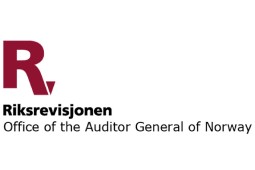
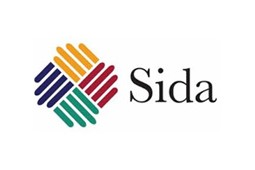

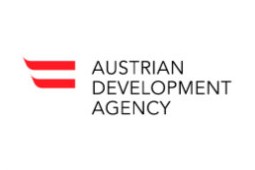
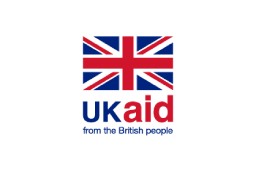
Earmarked Funding Partners
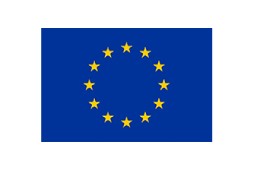

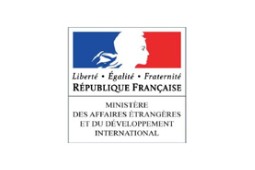
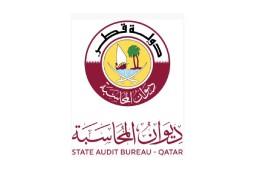
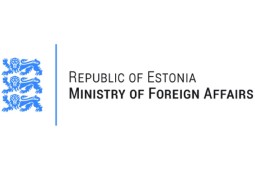
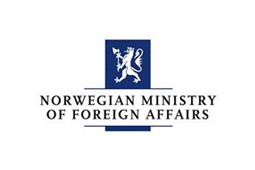

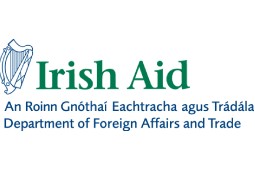
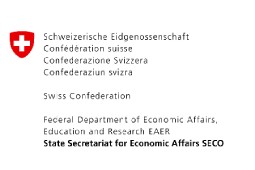
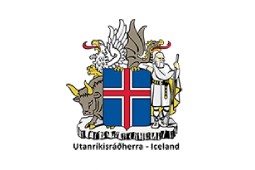
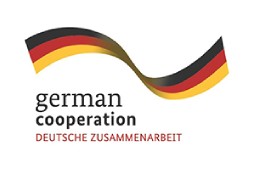
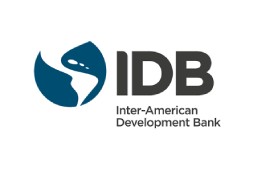
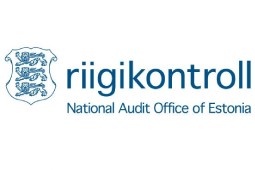
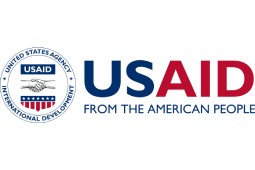
IN-KIND SUPPORT BY SAIs AND OTHER INSTITUTIONS
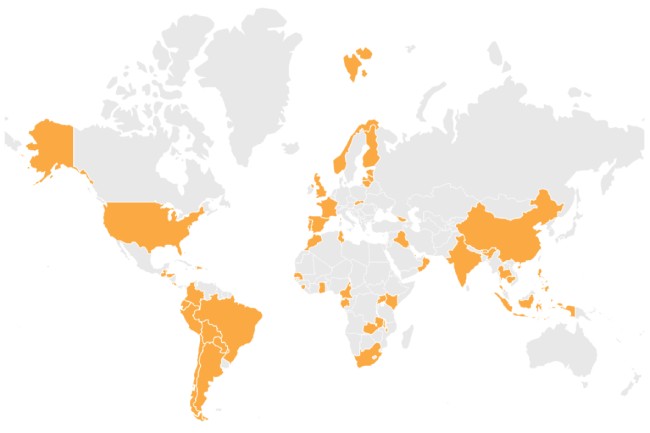
* ASEANSAI | INTOSAI Journal | INTOSAI Journal | World Bank | AFROSAI-E| CAROSAI | OLACEFS | OECD | IBP | IMF | IDB | CAS | MoF (Jamaica) | UNDRR | Norwegian Institute of Public Health | WHO | Asociaci n Civil por la Igualdad y la Justicia in Argentina (ACIJ) | OCP
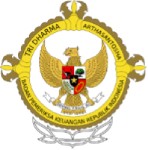
IDI and the Audit Board of Indonesia (BPK) are working together to promote professionalisation of SAIs by implementing ISSAIs, audit of implementation of SDGs, SAI PMF and blended learning solutions. The modalities include joint advocacy, hosting of events and provision of a staff member as an in-kind support. IDI provides technical expertise, guidance and resource material.
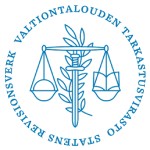
IDI and National Audit Office of Finland (NAOF) are cooperating for a vision of effective, accountable & inclusive SAIs making a difference in public sector governance & service delivery for the value and benefit of citizens. The cooperation covers auditing the implementation of SDGs, facilitating audit impact, SAI Innovations and SAI Young Leaders. NAOF provides one staff as in-kind support.
